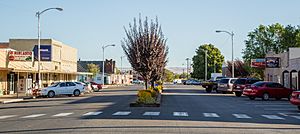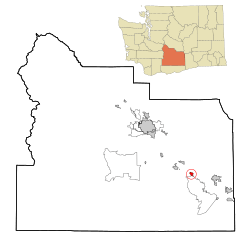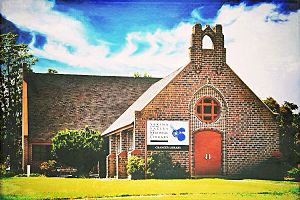Granger, Washington facts for kids
Quick facts for kids
Granger, Washington
|
|
|---|---|

Main Street
|
|
| Motto(s):
Where Dinosaurs Roam
|
|

Location of Granger in Washington
|
|
| Country | United States |
| State | Washington |
| County | Yakima |
| Area | |
| • Total | 1.74 sq mi (4.51 km2) |
| • Land | 1.73 sq mi (4.48 km2) |
| • Water | 0.01 sq mi (0.04 km2) |
| Elevation | 732 ft (223 m) |
| Population
(2020)
|
|
| • Total | 3,624 |
| • Estimate
(2021)
|
3,668 |
| • Density | 2,216.44/sq mi (855.85/km2) |
| Time zone | UTC-8 (PST) |
| • Summer (DST) | UTC-7 (PDT) |
| ZIP code |
98932
|
| Area code | 509 |
| FIPS code | 53-27960 |
| GNIS feature ID | 1505218 |
Granger is a city located in Yakima County, Washington, United States. In 2020, about 3,624 people lived there. It was once called a "town" but is now officially a "city."
Contents
History of Granger
Granger was started in 1902. It was named after Walter Granger. He was a manager for the Washington Irrigation Company. Walter Granger also helped plan the cities of Zillah and Sunnyside.
The town officially became a city on September 28, 1909. In the early 1900s, Granger had important businesses. These included a company that made tiles and bricks. There was also a cider mill that made apple cider.
Granger Farm Workers Camp
In May 1941, the Granger Farm Workers Camp opened. It was about two miles north of the city. This camp was built by the Farm Security Administration. Its purpose was to house people who had to leave their homes because of the Dust Bowl.
These people were often called "Dust Bowl refugees." At first, the camp housed White families. Later, it housed Mexican American families. They came to work in the Yakima Valley because there weren't enough workers during World War II. The camp closed down in the late 1960s.
Geography of Granger
Granger is located at 46°20′40″N 120°11′29″W / 46.34444°N 120.19139°W. This tells you its exact spot on a map.
The city covers a total area of about 1.80 square miles (4.66 square kilometers). Most of this area is land. Only a very small part, about 0.01 square miles (0.03 square kilometers), is water.
Granger's Population
| Historical population | |||
|---|---|---|---|
| Census | Pop. | %± | |
| 1910 | 453 | — | |
| 1920 | 412 | −9.1% | |
| 1930 | 568 | 37.9% | |
| 1940 | 752 | 32.4% | |
| 1950 | 1,164 | 54.8% | |
| 1960 | 1,424 | 22.3% | |
| 1970 | 1,567 | 10.0% | |
| 1980 | 1,812 | 15.6% | |
| 1990 | 2,053 | 13.3% | |
| 2000 | 2,530 | 23.2% | |
| 2010 | 3,246 | 28.3% | |
| 2020 | 3,624 | 11.6% | |
| 2021 (est.) | 3,668 | 13.0% | |
| U.S. Decennial Census 2020 Census |
|||
The population of Granger has grown a lot over the years. In 1910, there were 453 people. By 2020, the population had grown to 3,624 people.
Who Lives in Granger?
Based on the 2010 census, there were 3,246 people living in Granger. There were 774 households, which are groups of people living together. Most households, 66.3%, had children under 18 living with them.
About 60.2% of households were married couples. Some households had a female head without a husband (17.6%). Others had a male head without a wife (9.4%).
The people in Granger come from many backgrounds. About 48.6% were White. About 1.7% were Native American. A large group, 46.9%, were from other races. About 88.2% of the population identified as Hispanic or Latino.
The average age in the city was 22.2 years old. Many residents were young. About 43% of people were under 18. About 11% were between 18 and 24.
Dinosaur Art in Granger
Granger is famous for its amazing dinosaur models! There are 32 life-size dinosaur models displayed around the town. These dinosaurs are not real fossils. They are sculptures made from steel rods and chicken wire. Then, they are covered with a special cement mix.
The idea to have dinosaur exhibits started in 1993. It was a way to attract visitors to the town. The very first dinosaur was a young brontosaurus. It was put in Hisey Park in 1994.
Media and Community in Granger
Granger has a branch of the Yakima Valley Libraries system. This library is located in a building that used to be a Catholic church. The city's museum used to share this building. However, the museum moved to a new building in 2024.
Radio KDNA
The Latin radio station "Radio Cadena," also known as "Radio KDNA," has its building in Granger. It was first built in 1979. This radio station was very important for farm workers. It helped educate them and supported their organizations. It also offered programs in Spanish for families who did not speak English. A new station building was built in 2008.
Notable People from Granger
- Fred Oldfield was a famous cowboy and artist. He was originally from Alfalfa, which is a part of Granger.
See also
 In Spanish: Granger (Washington) para niños
In Spanish: Granger (Washington) para niños
 | Janet Taylor Pickett |
 | Synthia Saint James |
 | Howardena Pindell |
 | Faith Ringgold |


